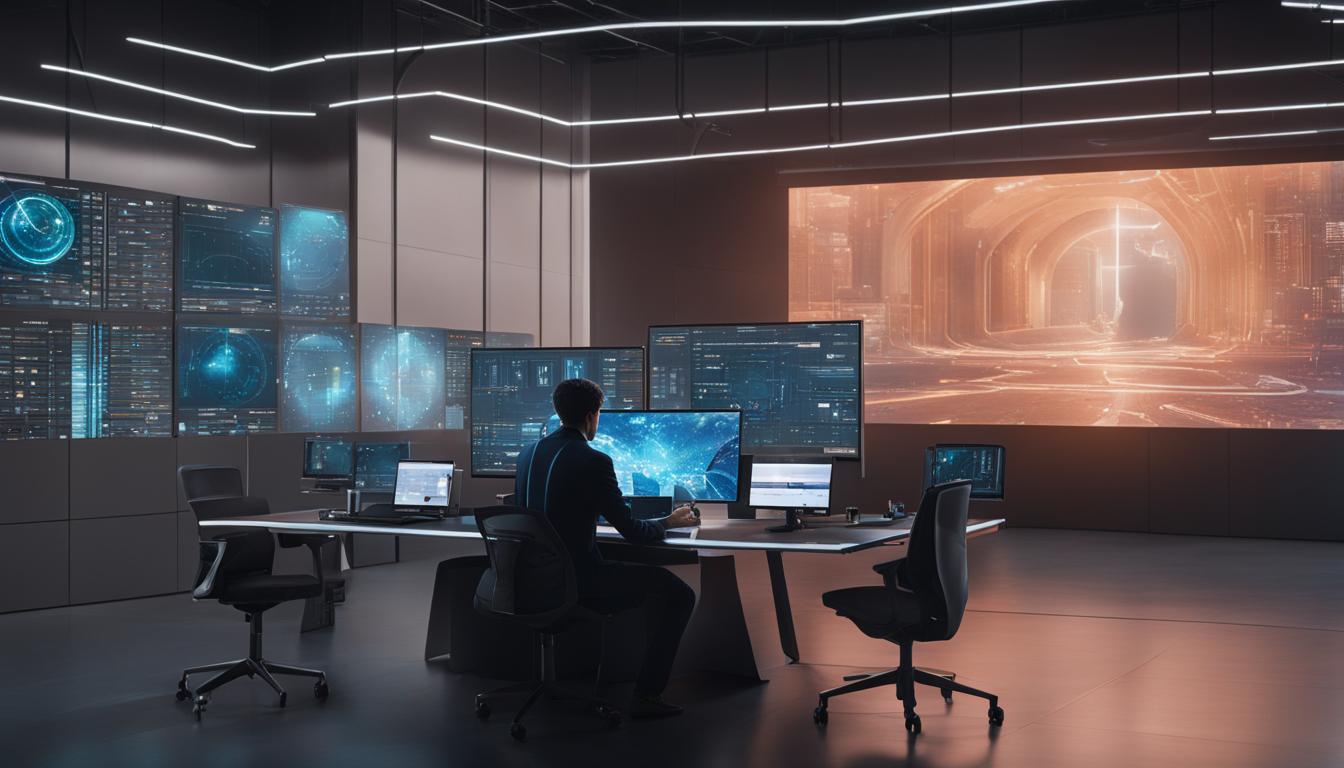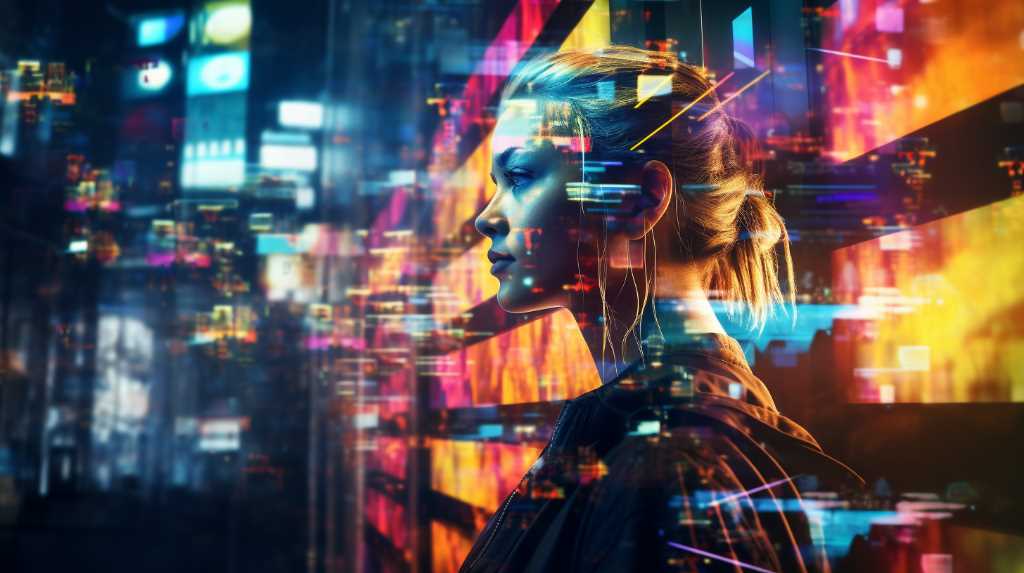In a time where rapid technological advancements are constantly changing industries, the important question of how AI impacts creative jobs remains a pressing concern for many professionals.
The convergence of artificial intelligence and creativity has sparked debates on the future of roles that were once thought to be immune to automation.
As we navigate this transformative landscape, it becomes essential to explore the potential implications, challenges, and strategies for those in creative fields.
Join us as we navigate the intricate interplay between AI and creative jobs, uncovering the potential disruptions and opportunities that lie ahead.
Key Takeaways
- Embracing AI enhances creativity and productivity in creative industries.
- Collaboration between AI and humans drives innovation and new opportunities.
- AI automates tasks but increases demand for human creative input.
- Adapting to AI integration is essential for future success in creative roles.
Impact of AI on Creative Industries
Embracing the transformative power of AI, the creative industries are witnessing a paradigm shift in the way tasks are automated and creativity is augmented. The integration of AI technologies is poised to revolutionize creative jobs by automating approximately 26% of tasks in arts, design, entertainment, media, and sports industries. While AI advancements bring advanced capabilities to marketing content creation, impacting advertising campaigns positively, concerns about job displacement loom on the horizon. Companies are actively exploring AI's value in creative industries, with McKinsey identifying significant opportunities in product development, marketing, and enhancing customer experiences.
The impact of AI on creative work is multifaceted, offering both opportunities and risks. The efficient implementation of AI tools can streamline processes, increase productivity, and enhance creativity. However, the potential for job displacement underscores the importance of managing ethical considerations and preparing for potential disruptions in the workforce. As AI continues to evolve, navigating the balance between leveraging its benefits and mitigating its challenges will be crucial in shaping the future of the creative industries.
Reshaping the Creative Workforce

The evolution of AI technologies is fundamentally reshaping the composition and dynamics of the creative workforce in unprecedented ways. As generative AI tools like ChatGPT and Midjourney continue to advance, the future of creative professions is being redefined. These artificial intelligence (AI) applications challenge traditional perceptions of creativity as solely human, with the potential to automate a significant 26% of tasks in industries such as arts, design, entertainment, media, and sports.
| Impact on Creative Workforce | ||
|---|---|---|
| Positive Aspects | Challenges | Future Implications |
| – Streamlining repetitive tasks | – Fear of job displacement | – Collaboration between AI and humans |
| – Enhanced creativity potential | – Need for upskilling | – New job roles focusing on AI integration |
| – Increased productivity | – Maintaining originality | – Shift towards hybrid skill sets |
The rise of generative AI is not just altering how work is done but also creating a demand for uniquely human creative inputs in the face of the influx of AI-generated content. Looking ahead, the creative workforce must adapt to a landscape where the synergy between AI and human creativity will drive innovation and new opportunities.
Adaptation Strategies for Creative Professionals
In the rapidly evolving landscape of the creative industry, strategic adaptation to AI technologies is essential for professionals seeking to thrive and lead in the future of creative work. Embracing AI tools, integrating them into creative workflows, and enhancing decision-making processes are key strategies for creative professionals looking to stay ahead in a rapidly changing environment.
Adaptation Strategies:
- Embrace AI Tools: Utilize AI tools to enhance productivity and creativity.
- Integrate AI into Workflows: Incorporate AI into creative processes for more efficient and effective outcomes.
- Enhance Decision-making: Use AI to make data-driven decisions and streamline processes.
- Focus on High-level Work: Let AI handle routine tasks, allowing professionals to focus on high-level creative work.
Challenges Posed by AI in Creative Jobs

Navigating the integration of AI technologies into creative roles presents a myriad of challenges that require strategic foresight and adaptability from professionals in the industry. With generative AI predicted to automate 26% of tasks in arts, design, entertainment, media, and sports industries, concerns have arisen about AI-generated content saturating markets and potentially displacing human creatives. The delicate balance between AI automation and human creativity is paramount in steering the course of creative jobs amidst this technological revolution.
AI applications such as ChatGPT and Midjourney exemplify the transformative potential within creative industries, showcasing both the capabilities and the looming challenges that AI brings. As generative AI continues to evolve, the economic landscape of creative jobs is also shifting, giving rise to the thriving creator economy and presenting new opportunities for monetizing creative work.
To thrive in this evolving environment, creative professionals must embrace innovation, hone their unique creative skills, and find ways to collaborate effectively with AI technologies to stay ahead in the ever-changing realm of creative jobs.
Future Outlook for Creative Careers
Amidst the evolving landscape of creative industries impacted by AI advancements, the future outlook for creative careers necessitates a proactive embrace of innovation and adaptability to harness emerging opportunities. As we navigate the intersection of creativity and artificial intelligence, several key considerations shape the future of work in creative fields:
- Harvard Business Review Insights: According to the Harvard Business Review, understanding how AI models can augment creative processes will be crucial for professionals in creative careers.
- Adaptation to AI Models: Embracing AI models like GPT-3 and DALL-E 2 will be essential for enhancing efficiency and exploring new creative possibilities.
- Reskilling and Upskilling: Investing in continuous learning and upskilling efforts will empower creatives to stay ahead in an AI-dominated landscape.
- Collaboration with Technology: Fostering collaborations between creatives and AI technologies can lead to innovative breakthroughs and redefine the boundaries of creativity in the digital age.
Frequently Asked Questions
Will AI Replace Creative Professions?
AI's rapid evolution raises questions on the future of creative professions. As technology advances, highly-skilled knowledge workers might face job displacement. The impact of AI on creative jobs is a critical concern demanding proactive strategies and adaptability.
How Will AI Affect the Creative Industry?
AI is reshaping the creative industry by streamlining tasks, enhancing productivity, and fostering innovation. As AI automates processes in arts, design, entertainment, media, and sports, companies are leveraging its potential in product development, marketing, and customer experience for competitive advantage.
How Can Artificial Intelligence Be Used in Creative Jobs?
Artificial intelligence revolutionizes creative jobs by enhancing ideation, automating tedious tasks, and producing intricate designs swiftly. From transforming sketches into realistic visuals to providing design elements, AI optimizes workflows, empowering creatives to focus on innovation.
What Jobs Will AI Eventually Replace?
AI will replace routine tasks across various industries, impacting roles like data entry, customer service, and repetitive manufacturing jobs. Highly analytical professions such as financial analysis and medical diagnostics are also susceptible to AI integration.
Conclusion
In the ever-evolving landscape of creative industries, the rise of AI poses a formidable challenge to traditional creative roles.
As AI technology continues to advance, the need for creative professionals to adapt and innovate becomes increasingly crucial.
The future of creative careers lies in embracing and harnessing the power of AI to enhance, rather than replace, human creativity.
By navigating this shifting paradigm with foresight and ingenuity, creative professionals can carve out new pathways to success in the digital age.









